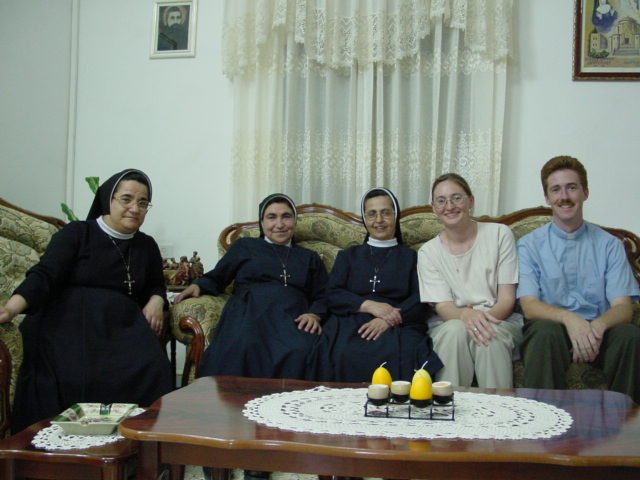June 8, 2002
No army entry into Zababdeh, and still no sign of the Jenin students. Because of military actions nearby, there are even several tanks parked at the nearby intersection between Misilye and Qabatiya. One of our teachers from Qabatiya came today, but had to travel through the hills to do so. We were hoping to visit a student in Qabatiya who is moving back to Romania next week, but tanks parked on the road make our visit unlikely.
Elizabeth spent the school day wrapping things up, completing her students' marks, and cleaning out her storage drawers. Marthame spent most of the morning working on a language lab proposal, something we are hoping to benefit from next year. There is a great need for more language instruction in the Jenin area, and we're hoping to add a language lab to our school facilities which will benefit our (and hopefully others') English education.
It is unbelievably hot, even for June in Palestine, and by noon everyone's brains are cooked in the school - time to head home for quiet and siesta. In the cooler afternoon, we headed out to fulfill some social requirements and visit friends. Weather like this helps us understand Arab hospitality a little better - as soon as you enter the home and sit down, you are given something cold to drink (whether you want it or not). Today, it was quite welcome.
An evening visit with the Rosary Sisters at their convent.
We also stopped by to see the Rosary Sisters in their Convent. We've just learned in the last few days that two of them are being transferred elsewhere - one to Beit Jala, the other to Jifna. They have both spent eight years in Zababdeh, which is an average term, so it is time for them to go. We’ll miss them.
Our Latin seminary students are back for the summer and, it seems, for the next year. The seminary, which is located in Beit Jala, has had numerous problems continuing safe education in the current sitution. As a result, they have decided to close the school (with the exception of twelfth graders and deacons) at least for a year. For this place, that's as far in advance as one can plan.
Friends showing off some of the harvested grain.
The many wheat fields surrounding the town have turned golden yellow, and people are busy harvesting them. Most of the grain is harvested by machine, and packed in big white sacks, but some is still cut by hand with sickles. Some of these hand-cut wheat ears are kept and even sold as home decoration - a wheat bouquet. Finally, mechanized balers cross the fields, making bales from the remains of the crop. From our window we see rows of green leafy tobacco, squash bordered by tall bright sunflowers, and a few spindly broom plants - patches of green laid out like so many ornaments on the golden fields of wheat.


